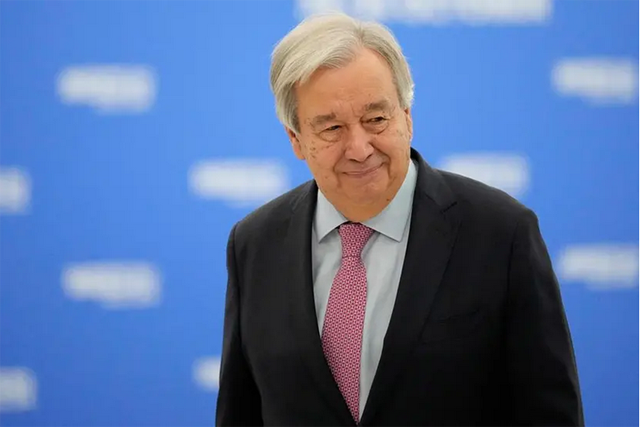You are here
Earth to warm up to 2.9ºC even with current climate pledges — UN
By AFP - Nov 20,2023 - Last updated at Nov 20,2023
PARIS — Countries’ greenhouse gas-cutting pledges put Earth on track for warming far beyond key limits, potentially up to a catastrophic 2.9ºC this century, the UN said Monday, urging G20 nations to boost emissions cuts.
The UN Environment Programme’s (UNEP’s) annual Emissions Gap report is released just ahead of crucial COP28 climate talks in Dubai and will feed into the global response to a sobering official “stocktake” of the failure to curb warming so far.
With this year expected to be the hottest in human history, UNEP said “the world is witnessing a disturbing acceleration in the number, speed and scale of broken climate records”.
Taking into account countries’ carbon-cutting plans, UNEP warned that the planet is on a path for disastrous heating of between 2.5ºC and 2.9ºC by 2100. Based just on existing policies and emissions-cutting efforts, global warming would reach 3ºC.
But the world continues to pump record levels of greenhouse gases into the atmosphere, with emissions up 1.2 per cent from 2021 to 2022, UNEP said, adding that the increase was largely driven by the burning of fossil fuels and industrial processes.
UNEP chief Inger Andersen said G20 nations — the world’s wealthiest economies responsible for around 80 per cent of emissions — need to lead on reductions, but noted some were in “snooze mode”.
“It is absolutely critical that the G20 step up,” she told AFP.
‘Ambitious and urgent’
The 2015 Paris Agreement saw countries agree to cap global warming at “well below” 2ºC above preindustrial times — with a safer limit of 1.5ºC if possible.
Nearly 1.2ºC of global heating so far has already unleashed an escalating barrage of deadly impacts across the planet.
UNEP said temperatures have gone above 1.5ºC for more than 80 days already this year, although the Paris warming thresholds will be measured as an average over several decades.
The Emissions Gap report looks at the difference between the planet-heating pollution that will still be released under countries’ de-carbonisation plans and what science says is needed to keep to the goals of the Paris Agreement.
The report called for “ambitious and urgent efforts from all countries to reduce fossil fuel use and de-forestation”.
By 2030, UNEP said, global emissions will have to be 28 per cent lower than current policies would suggest in order to stay below 2ºC, and 42 per cent lower for the more ambitious limit of 1.5ºC.
Last week, the UN’s World Meteorological Organisation said levels of the three main greenhouse gases — carbon dioxide, methane and nitrous oxide — all broke records last year.
‘Climate won’t wait’
Under the Paris deal, countries are required to submit ever deeper emission cutting plans, known as Nationally Determined Contributions, or NDCs.
UNEP found that fully implementing “unconditional” NDCs for 2030 — which countries plan regardless of external support — would give a 66 per cent likelihood of Earth’s average temperature rising by 2.9ºC by 2100.
Scientists warn that warming of these levels could render vast swathes of the planet essentially uninhabitable for humans and risk irreversible tipping points on land and in the oceans.
Conditional NDCs — which rely on international funding to achieve — would probably lower this to a still catastrophic 2.5ºC temperature rise this century, it said.
UNEP said that if all conditional NDCs and longer-term net zero pledges were met in their entirety it would be possible to limit temperature rise to 2ºC.
But it cautioned that currently these net zero pledges were not considered credible, with none of the G20 richest polluting nations reducing emissions in line with their own targets.
Even in the most optimistic scenario, the chance of limiting temperature rise to 1.5ºC is just 14 per cent, UNEP said.
UNEP said countries must set more ambitious NDCs — which are due to be updated by 2025.
Andersen said she is optimistic that countries will be able to make progress at the November 30 to December 12 COP28, despite the fractures caused by Russia’s invasion of Ukraine and the conflict between Israel and Hamas.
“Countries and delegations understand that, irrespective of these deep divisions that do exist and that are undeniable, the environment doesn’t wait and climate most certainly will not,” she said.
“You can’t press the pause button.”
Related Articles
PARIS — Renewed promises to slash greenhouse gas emissions from countries as part of the Paris climate deal are “very far” from what is requ
PARIS — Humanity is 'paying a terrible price' for inaction on global warming, with time running out to correct the course and avoid climate
PARIS — International climate pledges remain far off track to limit temperature rises to 1.5ºC, according to a UN report released on Wednesd

















